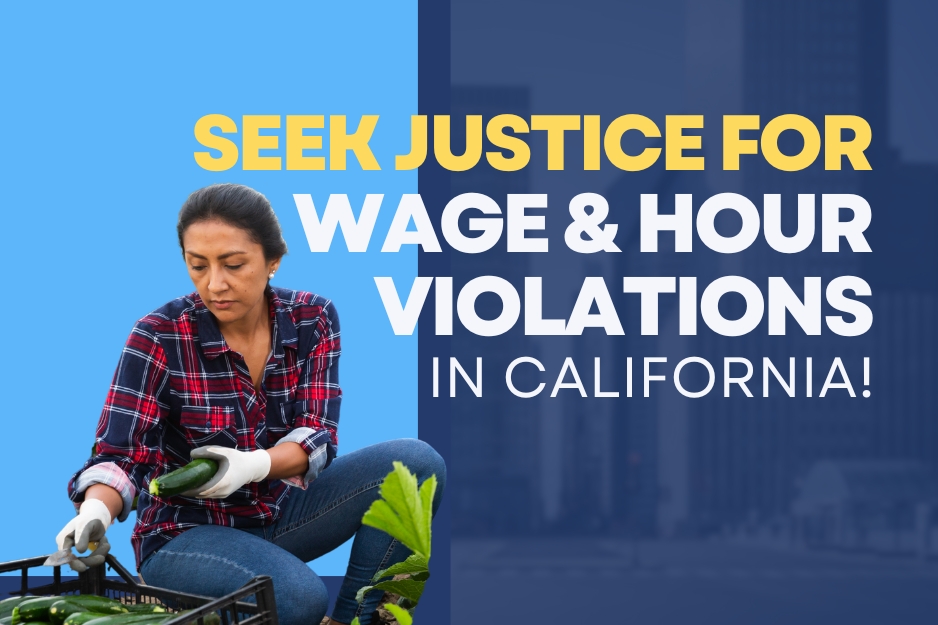
Standing Up Against Workplace Sexual Harassment: Know Your Legal Protections
Experiencing sexual harassment in the workplace can be both emotionally devastating and professionally disruptive. If you’re facing unwelcome sexual advances, inappropriate comments, or a hostile work environment in Los Angeles, it’s crucial to understand that you have clear legal rights and protections. California has some of the strongest workplace harassment laws in the nation, designed specifically to shield employees from such misconduct. Many victims remain silent out of fear of retaliation or uncertainty about their options, but knowing your rights is the first step toward addressing this serious issue and restoring your workplace dignity.
Don’t let workplace harassment silence your voice. At RD Law Group APC, we’re here to help you navigate your legal options and reclaim your dignity. Reach out to us today at (424) 535-1500 or contact us to take the first step toward a safer work environment.

Understanding Sexual Harassment Under California Law
Sexual harassment in the workplace is explicitly prohibited under both federal and California state law. The definition encompasses more than just obvious physical violations—it includes unwelcome sexual advances, requests for sexual favors, and other verbal, nonverbal, or physical conduct of a sexual nature. What many don’t realize is that harassment qualifies as illegal when it affects employment conditions or creates a hostile work environment.
This means even if you weren’t directly threatened with termination or denied a promotion, persistent inappropriate behavior that interferes with your ability to perform your job may still constitute actionable harassment. California sexual harassment law provides particularly robust protections, covering smaller employers than federal law does, and offering additional remedies for victims. Understanding these legal distinctions is essential for anyone navigating a potential sexual harassment case in Los Angeles.
The Critical Timeline for Reporting Sexual Harassment
When facing sexual harassment, timing matters significantly in preserving your legal rights. Reports of harassment should be made as soon as possible after experiencing or observing the harassment to ensure prompt and appropriate action can be taken. Delayed reporting can sometimes complicate cases, though courts recognize there are valid reasons why victims might hesitate to come forward immediately. Understanding the reporting timeline and process helps ensure your rights remain protected throughout this challenging experience.
-
Identify and document the offensive behavior as soon as it occurs, including dates, times, locations, witnesses, and exact descriptions of what happened
-
If you feel comfortable and safe doing so, you are strongly encouraged to directly advise the offender to stop the harassing behavior, which establishes clear boundaries and documentation
-
Report the harassment through proper workplace channels following your employer’s harassment policy, typically beginning with HR or a designated manager
-
File with government agencies within strict time limits—for the California Department of Fair Employment and Housing (DFEH), you typically have three years from the last incident, while EEOC complaints must generally be filed within 180-300 days
-
If sexual assault occurred alongside harassment, report to law enforcement immediately as this constitutes a crime beyond workplace misconduct and requires immediate intervention
Navigating Your Legal Options with Professional Guidance
When confronting sexual harassment, understanding your full range of legal options is crucial. Under California law, there are serious legal consequences for sexual harassment. First, you have the right to pursue your complaint internally through your employer’s reporting procedures. However, you’re not limited to internal channels—a legislative employee with a workplace harassment complaint may pursue the complaint with the U.S. Equal Employment Opportunity Commission. For California employees, the Department of Fair Employment and Housing (DFEH) offers additional avenues.
If these administrative remedies don’t resolve the situation, you may consider filing a lawsuit seeking various forms of compensation, including lost wages, emotional distress damages, and potentially punitive damages in egregious cases. At RD Law Group APC, we understand that each sexual harassment case presents unique challenges and emotional complexities. Our approach focuses on thoroughly understanding your specific situation before recommending the most effective path forward, whether that involves negotiation, mediation, or litigation when necessary.
Identifying Different Types of Workplace Sexual Harassment
Understanding the different forms of sexual harassment can help you better identify problematic behavior and articulate your experience when seeking help. Sexual harassment typically falls into two main categories: quid pro quo harassment and hostile work environment harassment. Recognizing these distinctions, along with the overall adverse effects of sexual harassment, is essential for building a strong case and determining the appropriate course of action. It’s also important to understand that harassment doesn’t have to be sexually motivated—it can be based on gender without sexual overtones and still qualify as sexual harassment under the law.
Quid Pro Quo vs. Hostile Work Environment
Quid pro quo harassment occurs when job benefits—such as promotions, assignments, or continued employment—are contingent upon submitting to sexual advances. This form of harassment typically involves someone in a position of power using that authority to pressure an employee for sexual favors. Hostile work environment harassment, by contrast, involves unwelcome conduct of a sexual nature that is severe or pervasive enough to create an intimidating, hostile, or offensive work environment.
This can include sexual jokes, displaying offensive material, unwanted touching, or persistent unwelcome comments about appearance. We’ve found that many clients don’t initially recognize that isolated incidents, if severe enough, can constitute hostile work environment harassment even without a pattern of behavior—a common misconception that prevents some victims from coming forward.
Employer Responsibilities and Confidentiality Protections
Employers in California have specific legal obligations to prevent and address sexual harassment in the workplace. Under state law, companies with five or more employees must provide sexual harassment prevention training, establish clear reporting procedures, and take immediate corrective action when harassment is reported. When you report sexual harassment, your employer is required to conduct a prompt, thorough, and impartial investigation. A critical aspect that many employees worry about is confidentiality—knowing that a report or complaint of harassment and documents related to any investigation shall be maintained confidentially to the extent possible pursuant to applicable law, rule or policy. Understanding these employer obligations can help you navigate the reporting process more effectively and hold your company accountable if they fail to meet their legal responsibilities.
What Constitutes an Adequate Employer Response
An adequate employer response to a sexual harassment complaint must be prompt, thorough, and designed to effectively end the harassment. When evaluating whether your employer has appropriately addressed your complaint, consider whether they: took your report seriously without dismissing or minimizing your experience, conducted a timely and impartial investigation, implemented appropriate disciplinary measures against the harasser, and took steps to prevent future harassment. Employers should also protect complainants from retaliation and provide support resources. If your employer fails to meet these standards, this failure may strengthen a potential legal claim and could subject them to additional liability. Many Los Angeles employers fall short by conducting superficial investigations or taking token actions that don’t effectively address the underlying problem.
Protecting Yourself Against Workplace Retaliation
Fear of retaliation prevents many sexual harassment victims from coming forward. However, both federal and California state laws explicitly prohibit employers from retaliating against employees who report harassment or participate in related investigations. Retaliation can take many forms, including termination, demotion, undesirable reassignment, reduction in hours or pay, negative performance reviews, or creating a hostile environment designed to force resignation. If you experience adverse employment actions after reporting sexual harassment, this may constitute illegal retaliation, giving rise to additional legal claims separate from the original harassment complaint. Documentation becomes especially crucial in these situations—keep detailed records of any changes in how you’re treated following your report.
Documenting Harassment and Potential Retaliation
Proper documentation significantly strengthens your position in sexual harassment and retaliation cases. Maintain a detailed log of all harassing incidents, including dates, times, locations, witnesses, and exact descriptions of what occurred. Save all relevant communications, including emails, text messages, social media posts, and written notes. If verbal harassment occurs, document it immediately afterward with detailed notes.
For potential retaliation, document changes in your work assignments, performance evaluations, or treatment by supervisors and colleagues following your complaint. This evidence creates a timeline that can establish patterns of behavior and connect negative employment actions to your protected activity of reporting harassment. California’s two-party consent law for recordings means you generally cannot secretly record conversations, but you can document them afterward in writing.
Frequently Asked Questions
-
What exactly qualifies as sexual harassment under California law?
Under California law, sexual harassment includes unwelcome sexual advances, requests for sexual favors, and other verbal, nonverbal or physical conduct of a sexual nature that affects employment conditions or creates a hostile work environment. This encompasses a wide range of behaviors from explicit requests for sexual favors in exchange for promotions (quid pro quo harassment) to creating a hostile work environment through persistent sexual jokes, comments, or displays of offensive material. California’s definition is intentionally broad to provide comprehensive protection for workers, covering behavior that might not rise to the level of criminal conduct but still interferes with an employee’s right to work in a respectful environment.
-
How soon should I report workplace harassment to protect my rights in Los Angeles?
Reports of harassment should be made as soon as possible after experiencing or observing the harassment so that prompt and appropriate action can be taken. While there’s no specific deadline for internal reporting, delays can sometimes be used to question the severity of the harassment. For legal claims, strict deadlines apply: you generally have three years to file with California’s Civil Rights Department (formerly DFEH) and 180-300 days to file with the EEOC (depending on whether your state has its own anti-discrimination laws). Working with a workplace harassment attorney Los Angeles employees trust can help ensure you meet all critical deadlines while building the strongest possible case.
-
Can my employer maintain confidentiality when I file a sexual harassment complaint?
Yes, a report or complaint of harassment and documents related to any investigation shall be maintained confidentially to the extent possible pursuant to applicable law, rule or policy. However, it’s important to understand that complete confidentiality cannot always be guaranteed, as the investigation process typically requires sharing some information with the accused party and potential witnesses. Your employer should inform you about how information will be handled and take steps to limit disclosure to only those with a legitimate need to know. If you’re concerned about confidentiality, consider discussing these concerns with a Los Angeles sexual harassment attorney who can advise you on additional protections and what to expect during the process.
-
What damages can I recover in a California sexual harassment lawsuit?
In a California sexual harassment lawsuit, you may be eligible to recover several types of damages, including: economic damages (back pay, front pay, lost benefits, medical expenses, and therapy costs), non-economic damages (emotional distress, pain and suffering, loss of enjoyment of life), punitive damages in cases of particularly egregious conduct, and attorney’s fees and costs. California law does not cap compensatory or punitive damages in sexual harassment cases, unlike federal law, which makes state claims often more valuable. Additionally, successful plaintiffs may obtain injunctive relief, such as policy changes at the workplace or reinstatement to a position. Each case is unique, and the specific damages available depend on the particular circumstances and impact of the harassment.
-
How can a workplace discrimination lawyer in California help with my sexual harassment case?
A workplace discrimination lawyer in California provides crucial assistance throughout the sexual harassment claim process. They can help evaluate the strength of your case, properly document the harassment, file administrative complaints with the appropriate agencies, negotiate settlements, and represent you in litigation if necessary. An experienced attorney will understand the nuances of California’s strong worker protection laws and how they differ from federal standards. They can also help navigate the emotional complexities of sexual harassment cases, protect you from retaliation, maximize potential compensation, and ensure your employer follows proper investigation procedures. Most importantly, having legal representation signals to employers that you’re serious about enforcing your rights, which often leads to more favorable outcomes.
Work with a Sexual Harassment Lawyer
Confronting workplace sexual harassment requires courage, knowledge, and skilled guidance. A sexual harassment lawyer in Los Angeles can provide critical support through every stage of addressing harassment, from documenting incidents and filing administrative complaints to negotiating settlements and litigating when necessary. When selecting an attorney, look for someone with specific experience in California workplace harassment law, a track record of successful outcomes, and an approach that makes you feel comfortable discussing sensitive matters.
The right attorney will help you understand all available options, set realistic expectations, and develop a strategy tailored to your specific circumstances and goals. Most sexual harassment attorneys offer confidential consultations to discuss your situation and explain potential paths forward. Taking this step doesn’t commit you to legal action but provides valuable clarity about your rights and options during a challenging time.
Don’t let the shadows of workplace harassment dim your professional light. At RD Law Group APC, we’re ready to stand by your side and illuminate your legal path. Reach out to us at (424) 535-1500 or contact us to begin your journey toward justice and a respectful work environment.



